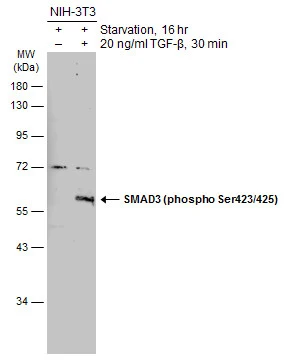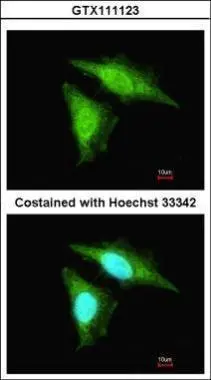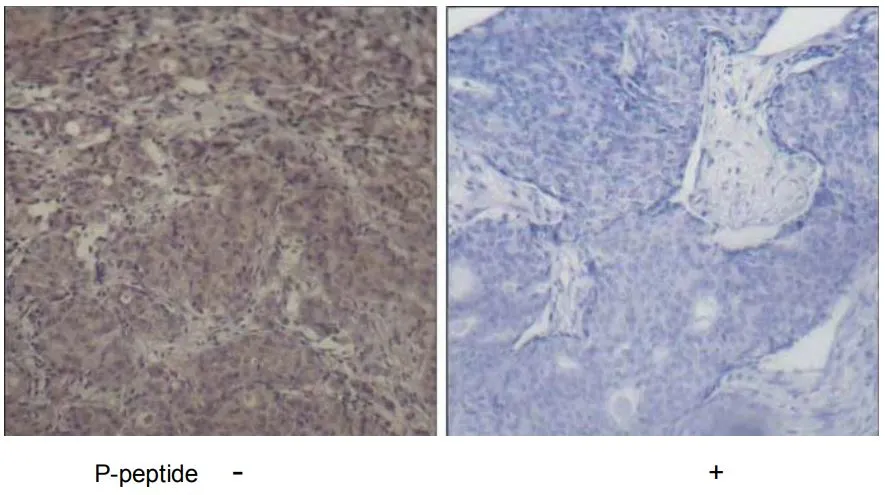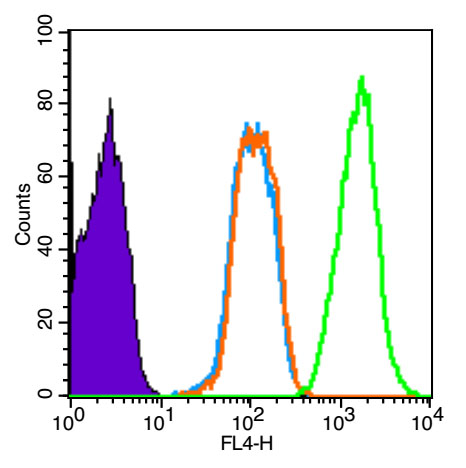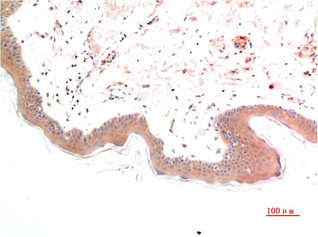![Untreated (–) and treated (+) A549 whole cell extracts (30 μg) were separated by 10% SDS-PAGE, and the membrane was blotted with SMAD3 (phospho Ser423/Ser425) antibody [GT1207] (GTX00969) diluted at 1:500. The HRP-conjugated anti-rabbit IgG antibody (GTX213110-01) was used to detect the primary antibody. Untreated (–) and treated (+) A549 whole cell extracts (30 μg) were separated by 10% SDS-PAGE, and the membrane was blotted with SMAD3 (phospho Ser423/Ser425) antibody [GT1207] (GTX00969) diluted at 1:500. The HRP-conjugated anti-rabbit IgG antibody (GTX213110-01) was used to detect the primary antibody.](https://www.genetex.com/upload/website/prouct_img/normal/GTX00969/GTX00969_4000000170_20200313_WB_treatment_TGF-beta1_w_23053121_737.webp)
Untreated (–) and treated (+) A549 whole cell extracts (30 μg) were separated by 10% SDS-PAGE, and the membrane was blotted with SMAD3 (phospho Ser423/Ser425) antibody [GT1207] (GTX00969) diluted at 1:500. The HRP-conjugated anti-rabbit IgG antibody (GTX213110-01) was used to detect the primary antibody.
SMAD3 (phospho Ser423/Ser425) antibody [GT1207]
GTX00969
ApplicationsWestern Blot, ImmunoHistoChemistry, ImmunoHistoChemistry Paraffin
Product group Antibodies
ReactivityHuman, Mouse, Rat
TargetSMAD3
Overview
- SupplierGeneTex
- Product NameSMAD3 (phospho Ser423/Ser425) antibody [GT1207]
- Delivery Days Customer9
- Application Supplier NoteWB: 1:500 - 1:2000. IHC-P: 1:50 - 1:200. *Optimal dilutions/concentrations should be determined by the researcher.Not tested in other applications.
- ApplicationsWestern Blot, ImmunoHistoChemistry, ImmunoHistoChemistry Paraffin
- CertificationResearch Use Only
- ClonalityMonoclonal
- Clone IDGT1207
- ConjugateUnconjugated
- Gene ID4088
- Target nameSMAD3
- Target descriptionSMAD family member 3
- Target synonymsHSPC193, HsT17436, JV15-2, LDS1C, LDS3, MADH3, hMAD-3, hSMAD3, mad3, mothers against decapentaplegic homolog 3, MAD homolog 3, MAD, mothers against decapentaplegic homolog 3, SMA- and MAD-related protein 3, SMAD, mothers against DPP homolog 3, mad homolog JV15-2, mad protein homolog, mothers against DPP homolog 3
- HostRabbit
- IsotypeIgG
- Protein IDP84022
- Protein NameMothers against decapentaplegic homolog 3
- Scientific DescriptionThe protein encoded by this gene belongs to the SMAD, a family of proteins similar to the gene products of the Drosophila gene mothers against decapentaplegic (Mad) and the C. elegans gene Sma. SMAD proteins are signal transducers and transcriptional modulators that mediate multiple signaling pathways. This protein functions as a transcriptional modulator activated by transforming growth factor-beta and is thought to play a role in the regulation of carcinogenesis. [provided by RefSeq, Apr 2009]
- ReactivityHuman, Mouse, Rat
- Storage Instruction-20°C or -80°C,2°C to 8°C
- UNSPSC12352203
References
- Luo D, Zeng X, Zhang S, et al. Pirfenidone suppressed triple-negative breast cancer metastasis by inhibiting the activity of the TGF-β/SMAD pathway. J Cell Mol Med. 2023,27(3):456-469. doi: 10.1111/jcmm.17673Read this paper
- Chen W, Zhang F, Hou X, et al. Ameliorating role of microRNA-378 carried by umbilical cord mesenchymal stem cells-released extracellular vesicles in mesangial proliferative glomerulonephritis. Cell Commun Signal. 2022,20(1):28. doi: 10.1186/s12964-022-00835-1Read this paper
- Chen HY, Chou HC, Ho YJ, et al. Characterization of TGF-β by Induced Oxidative Stress in Human Trabecular Meshwork Cells. Antioxidants (Basel). 2021,10(1). doi: 10.3390/antiox10010107Read this paper
- Marín-Ramos NI, Thein TZ, Ghaghada KB, et al. miR-18a Inhibits BMP4 and HIF-1α Normalizing Brain Arteriovenous Malformations. Circ Res. 2020,127(9):e210-e231. doi: 10.1161/CIRCRESAHA.119.316317Read this paper

![IHC-P analysis of rat brain tissue section using GTX00969 SMAD3 (phospho Ser423/Ser425) antibody [GT1207]. Dilution : 1:100 IHC-P analysis of rat brain tissue section using GTX00969 SMAD3 (phospho Ser423/Ser425) antibody [GT1207]. Dilution : 1:100](https://www.genetex.com/upload/website/prouct_img/normal/GTX00969/GTX00969_20200327_IHC-P_35_w_23053121_917.webp)
![IHC-P analysis of mouse testis tissue section using GTX00969 SMAD3 (phospho Ser423/Ser425) antibody [GT1207]. Dilution : 1:100 IHC-P analysis of mouse testis tissue section using GTX00969 SMAD3 (phospho Ser423/Ser425) antibody [GT1207]. Dilution : 1:100](https://www.genetex.com/upload/website/prouct_img/normal/GTX00969/GTX00969_20200327_IHC-P_37_w_23053121_739.webp)
![WB analysis of C6 cell extracts with/without PMA/TPA (200 nM, 37oC, 10 min) treatment using GTX00969 SMAD3 (phospho Ser423/Ser425) antibody [GT1207]. Dilution : 1:1000 Loading : 25μg WB analysis of C6 cell extracts with/without PMA/TPA (200 nM, 37oC, 10 min) treatment using GTX00969 SMAD3 (phospho Ser423/Ser425) antibody [GT1207]. Dilution : 1:1000 Loading : 25μg](https://www.genetex.com/upload/website/prouct_img/normal/GTX00969/GTX00969_20200327_WB_1_w_23053121_349.webp)
![IHC-P analysis of human esophageal tissue section using GTX00969 SMAD3 (phospho Ser423/Ser425) antibody [GT1207]. Dilution : 1:100 IHC-P analysis of human esophageal tissue section using GTX00969 SMAD3 (phospho Ser423/Ser425) antibody [GT1207]. Dilution : 1:100](https://www.genetex.com/upload/website/prouct_img/normal/GTX00969/GTX00969_20200327_IHC-P_36_w_23053121_351.webp)

